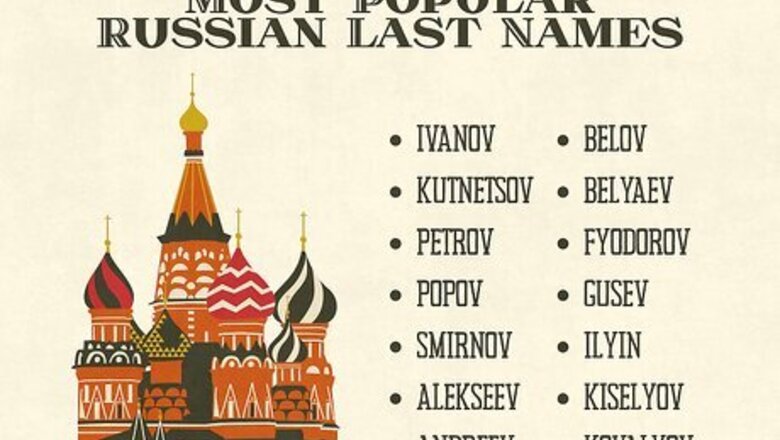
views
Most Popular Russian Last Names
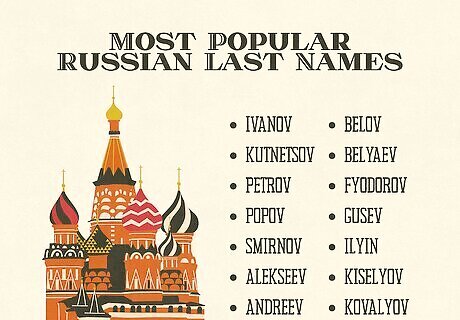
Ivanov, Kutnetsov, Petrov, and Smirnov are the most common surnames. The following list contains the most widespread surnames in Russia, which often reflect historical origins related to occupations, geography, or personal characteristics. Here are the most popular Russian surnames, along with what they mean: Ivanov - Means “son of Ivan.” Kutnetsov - Means “blacksmith.” Petrov - Means “son of Pyotr.” Popov - Means “son of the priest.” Smirnov - Means “peaceful,” “quiet,” or “calm.” Alekseev - Means “son of Alexei.” Andreev - Means “son of Andrei.” Belov - Means “white” or “pale.” Belyaev - Means “white” or “blonde.” Fyodorov - Means “son of Fyodor.” Gusev - Means “goose.” Ilyin - Means “son of Ilya.” Kiselyov - Means “kissel,” a traditional fruit jelly. Komarov - Means “gnat” or “mosquito.” Kovalyov - Means “son of the blacksmith.” Kuzmin - Means “son of Kuzma.” Makarov - Means “son of Makary.” Mikhailov - Means “son of Mikhail.” Nikitin - Means “son of Nikita.” Nikolaev - Means “son of Nikolai.” Novikov - Means “newcomer.” Pavlov - Means “son of Pavel.” Semyonov - Means “son of Semyon.” Sidrov - Means “son of Sidor.” Solovyov - Means “nightingale.” Stepanov - Means “son of Stephan.” Tarasov - Means “son of Taras.” Titov - Means “son of Tit.” Vassiliev - Means “son of Vassily.” Yegorov - Means “son of Yegor.” Zakharov - Means “son of Zakhar.”
Rare & Unique Russian Last Names
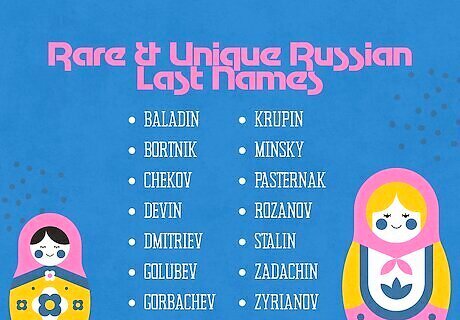
Baladin, Bortnik, and Krupin are some of the rarest Russian surnames. Although the following surnames are relatively uncommon, you might come across them from time to time. Some hold strange meanings, while others are simply outdated. Here’s a quick list of rare and unique options: Baladin - Means “a small crater on the moon.” Beles - Means “kind” or “nice.” Bortnik - Means “beekeeper.” Chekov - Means “Czech.” Devin - Means “sorcerer” or “fortune teller.” Dmitriev - Means “son of Dmitry.” Golubev - Means “dove” or “pigeon.” Gorbachev - Means “hunchback.” Krupin - Means “barley” or “grain.” Minsky - Means “from Minsk,” the capital of Belarus. Pasternak - Means “parsnip.” Rozanov - Mean “of the rose.” Stalin - Means “man of steel.” Zadachin - Means “good luck.” Zolotov - Means “gold.” Zyrianov - Refers to the Zyryan people.
Cool Russian Last Names
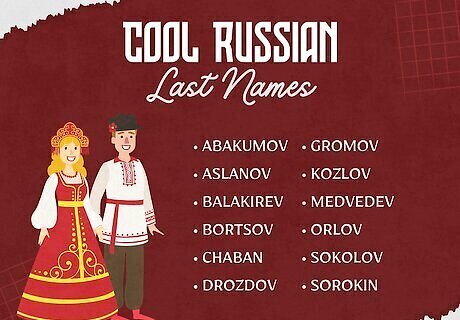
These Russian surnames symbolize animals, nature, and strong concepts. Surnames, like Gromov and Volkov, sound edgy and evoke stereotypically masculine elements. Here are other cool Russian surnames, plus their meanings: Abakumov - Means “son of Abakum” or “to wrestle.” Alatortsev - Means “artisan” or “tradesperson.” Aslanov - Means “son of Aslan,” with Aslan meaning “lion” in Turkic and Persian. Balakirev - Means “stubborn child.” Bortsov - Means “son of Bort,” which can refer to “fencing” or “a stand of trees.” Chaban - Means “shepherd.” Drozdov - Means “blackbird.” Gromov - Means “thunder.” Kozlov - Means “goat.” Medvedev - Means “bear.” Orlov - Means “eagle.” Sokolov - Means “falcon” or “hawk.” Sorokin - Means “magpie.” Volkov - Means “wolf.” Zaitsev - Means “hare.”
Pretty Russian Last Names
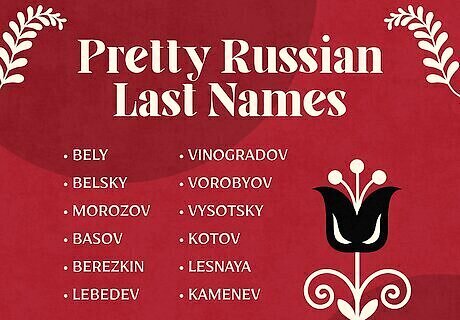
Some Russian surnames, like Morozov and Lebedev, are aesthetically pleasing. The following surnames are inspired by nature, gentle concepts, or simply sound beautiful. Here are some pretty examples, with their meanings: Bely - Means “white.” Belsky - Means “white.” Morozov - Means “frost.” Basov - Means “beauty” or “decoration.” Berezkin - Means “birch tree.” Cheremushkina - Means “bird cherry.” Lebedev - Means “swan.” Vinogradov - Means “grapes.” Vorobyov - Means “sparrow.” Vysotsky - Means “high” or “tall.” Kotov - Means “cat.” Lesnaya - Means “forest.” Kamenev - Means “stone.” Vornin - Means “crow.” Zuma - Means “winter.”
Rich Russian Last Names
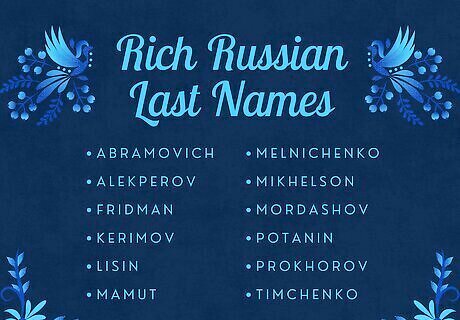
These surnames are associated with the wealthiest people in Russia. You might not come across these surnames frequently, but they’re widely known and respected throughout the country. Here are some prominent surnames tied to wealthy individuals and families, along with their meanings: Abramovich - Means “son of Abram.” Alekperov - Means “son of Alek.” Fridman - Means “man or peace.” Kerimov - Means “generous,” “noble,” or “honorable.” Lisin - Means “fox.” Mamut - Means “mammoth.” Melnichenko - Means “descendant of a miller.” Mikhelson - Means “son of Mikhail.” Mordashov - Means “face” or “muzzle.” Potanin - Means “to flow” or “to pour.” Prokhorov - Means “to dance in front,” “to lead,” or “the choir director.” Timchenko - Means “son of Timofey,” which is a Greek name meaning “honoring God.” Tolstoy - Means “thick,” “stout,” or “fat.” Usmanov - Means “bonesetter” or “the chosen one.” Vasiliev - Means “royal” or “kingly.” Volkonsky - Means “from the city of Volkonsk.”
Royal Russian Last Names
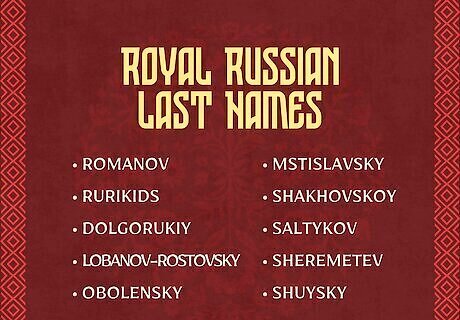
These surnames are connected to Russian royalty and aristocratic families. The primary Russian royal surname is Romanov, which was the last imperial dynasty and only family to hold the title of Tsar. Other historically noble, but not royal, surnames include Dolgorukiy, Saltykov, and Shuysky. Here are more examples, along with their meanings: Romanov - Means “son of Roman.” Rurikids - Means “son of Rurik.” Dolgorukiy - Means “long-handed” or “long-armed.” Lobanov-Rostovsky - Lobanov means “forehead,” while Rostovsky means “the ancient city of Rostov.” Obolensky - Means “to pay” or “to give.” Mstislavsky - Means “vengeful glory.” Shakhovskoy - Derives from the House of Shakhovskoy, which claimed descent from Konstantin Glebovich. Saltykov - Tied to the Saltykov family, who were granted the title of Count in 1730. Sheremetev - Means “to be a shepherd” or “to graze.” Shuysky - Tied to the princely House of Shuysky, a cadet branch of the Rurikid dynasty.
Russian Surname Origins & Naming Conventions
Russian surnames first appeared during the Middle Ages. People from the city of Novgorod were the first Russians to acquire surnames. Moscow aristocracy began using them in the 14th and 15th centuries, while peasants didn’t adopt surnames until the feudal system was abolished in the 19th century. With that being said, not everyone had a surname until the 1930s, when the Soviet Union mandated them for governmental and administrative purposes. Surnames were often derived from patronymics, occupations, geography, or personal traits. Traditionally, married women use their husband’s surname, but this hasn’t been legally required since 1918. To identify a Russian female surname, look for feminine endings, such as “-ova,” “-eva,” “-ina,” “-skaya,” or “-tskaya.” For example, the feminine form of Ivanov is Ivanoca.
Frequently Asked Questions
What are common Russian Jewish last names? These surnames (along with other Jewish surnames often indicate ancestry from specific regions or professions, or derive from a father’s name. Here are some popular Russian Jewish last names and their meanings: Dvorkin - Means “son of Dvorka.” Feldman - Means “field man.” Friedman - Means “peace.” Goldberg - Means “mountain of gold.” Kaplan - Means “chaplain or priest.” Kaplan - Means “chaplain or priest.” Kogan - Means “priest.” Rabinovich - Means “son of the rabbi.” Shapiro - Means “tailor.” Weinberg - Means “vineyard mountain.”
Do Russians call each other by their full names? No, Russians don’t typically address each other by their full names. They do, however, use their first name and patronymic as a sign of respect in formal and official contexts, such as school or work. For example, a student would address their teacher, Igor Mihajlovich Medvedev, as “Igor Medvedev.”
Do Russian last names come first? No, the typical order for a full name is first name, middle patronymic name, and then last name. With that being said, the surname always comes before the first name and patronymic name in official documents.
What are the most popular male and female Russian first names? Many Russian first names come from the Orthodox Christian calendar, which commemorates saints on specific dates. Here are some of the most popular first names for males and females: Male - Alexander, Mikhail, Maxim, Lev, Artyom, Mark, Ivan, Dmitry, Matvey, Daniil Female - Sofya, Mariya, Anna, Alisa, Eva, Viktoriya, Polina, Alexandra, Elizaveta, Varvara













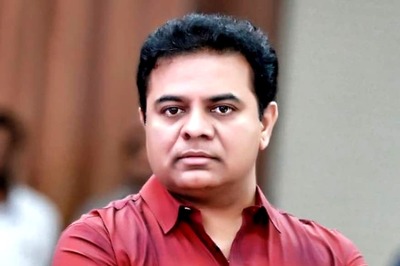
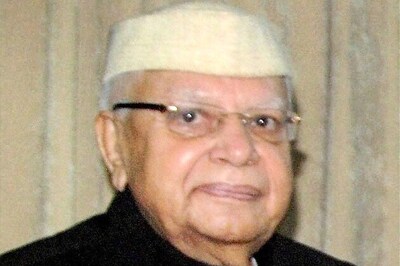



Comments
0 comment